Legislator Chiang Wan-an (蔣萬安) yesterday won the Taipei mayoral election, with the Chinese Nationalist Party (KMT) candidate defeating the Democratic Progressive Party’s (DPP) pick, former minister of health and welfare Chen Shih-chung (陳時中), and former Taipei deputy mayor Vivian Huang (黃珊珊), an independent.
After polling stations closed at 4pm, the Taipei Election Commission issued a preliminary estimate that voter turnout in the city was about 64 percent, slightly lower than in 2018.
Chiang, 43, is to be the youngest Taipei mayor ever, with the KMT regaining the capital after eight years.
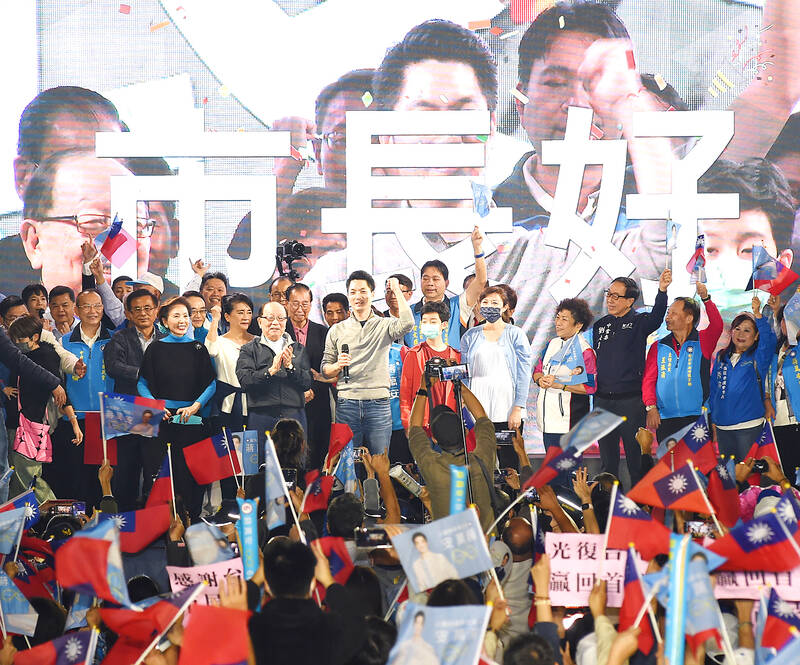
Photo: Fang Pin-chao, Taipei Times
Chen had an exceptionally high national approval rating when he was head of the Central Epidemic Command Center during the first two years of the COVID-19 pandemic.
However, he failed to counter critics throughout his campaign involving local COVID-19 outbreaks and vaccine issues.
At about 7pm, Chen conceded defeat to Chiang and apologized to his supporters for disappointing them, repeatedly thanking them for their backing.
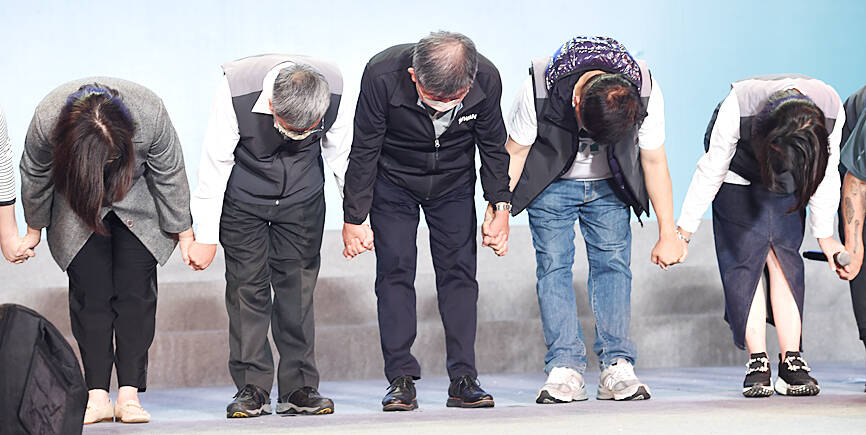
Photo: Liu Hsin-te, Taipei Times
“Whenever I see everyone looking at me with eyes full of expectation, how I wish I could realize our collective dreams and set this city on a new path toward change, but Taipei residents have chosen another future mayor, so I hope everyone can join me in sincerely congratulating Chiang Wan-an,” he said.
He said he had called Chiang to congratulate him and hopes everyone can come together, irrespective of their political preferences, to support Chiang in doing a good job of governing Taipei.
Chen said he hoped criticism of Taiwan’s COVID-19 prevention efforts would stop after the elections, as the city and the nation must move forward.
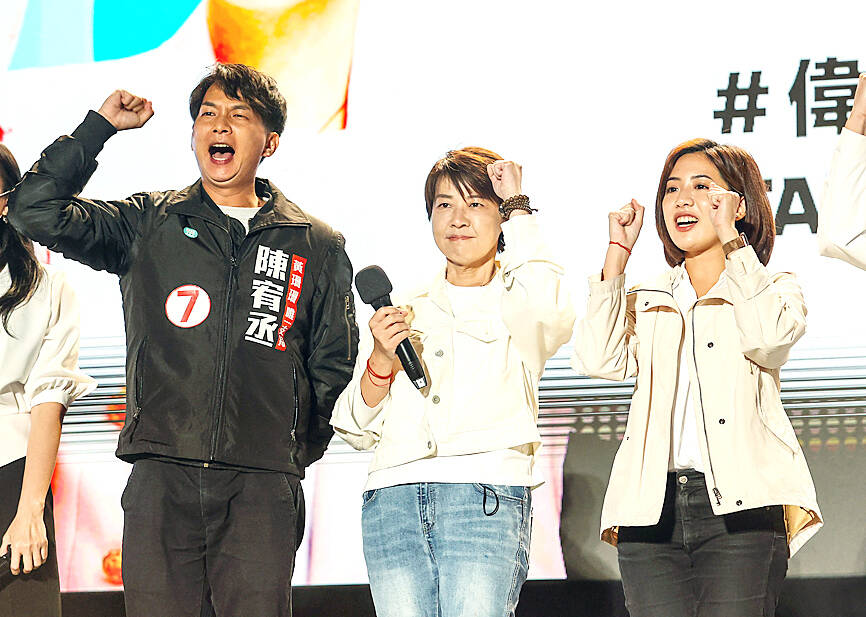
Photo: CNA
He also urged his supporters to continue supporting President Tsai Ing-wen (蔡英文) to maintain a steady pace in the face of post-pandemic economic challenges.
At about 7:20pm, Huang also conceded defeat and thanked her supporters for “fighting a good fight” with her.
Although the result was below expectations, she would continue to focus on people and push political parties to the side, dedicating her life to her hometown, Taipei, she said.
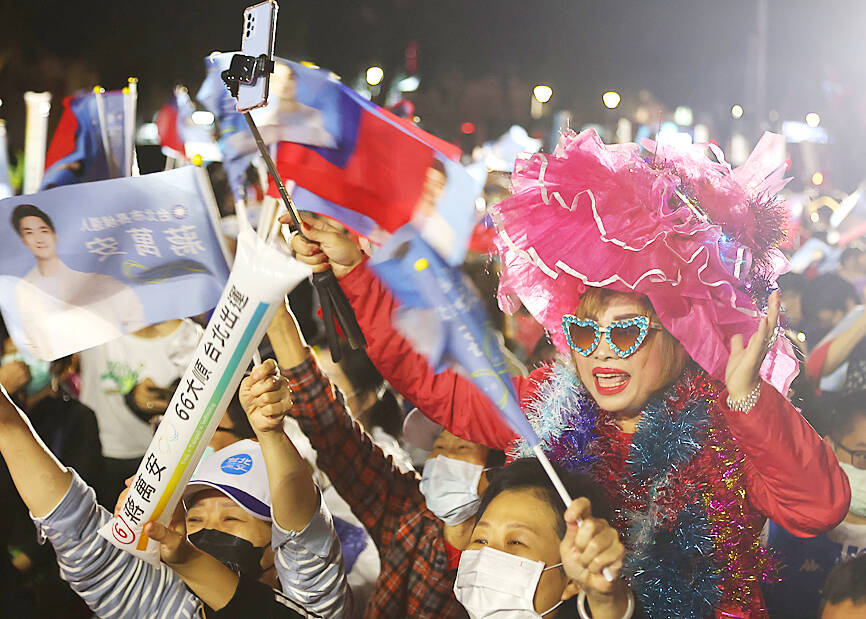
Photo: CNA
She also urged Chiang to keep his word and accomplish his campaign promises, enabling Taipei to progress further.
At about 8pm, Chiang declared victory, saying that it was not his victory, but rather Taipei residents voting to ensure that honesty defeated lies, democracy defeated black-box operations and light defeated darkness.
He said he highly respects Huang and Chen, and thanked them for pointing out policy directions during campaigning.
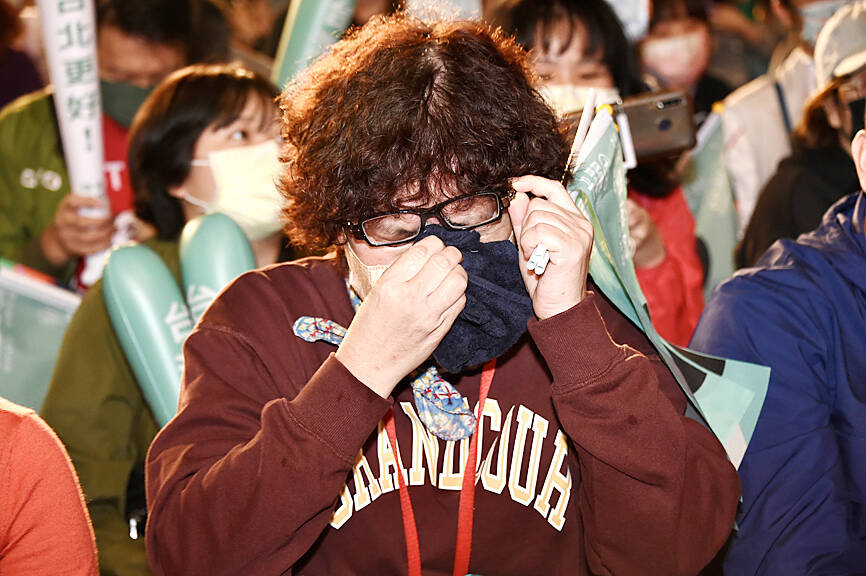
Photo: Tu Chien-jung, Taipei Times
They set a good example regarding democracy, allowing the election to proceed smoothly, Chiang said.
He said he was thankful to his supporters for trusting him and placing Taipei’s future in his hands, but he was also thankful to those who did not vote for him, as they would monitor him, so his team would be humble and try their hardest over the next four years.
In the 2018 local elections, Ko Wen-je (柯文哲) won a narrow victory by 3,567 votes to become mayor, defeating former legislator Ting Shou-chung (丁守中) of the KMT.
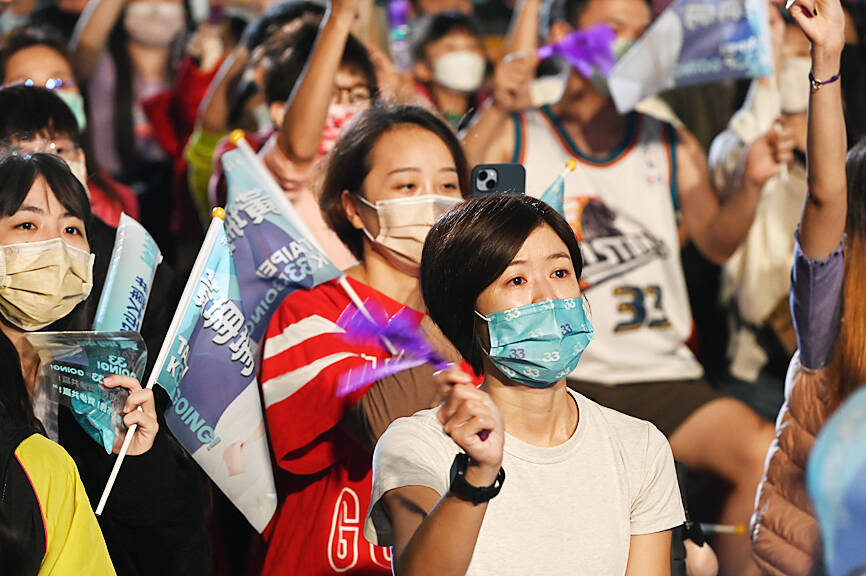
Photo: Tien Yu-hua, Taipei Times
The final result was announced after 2am the next morning.
With a voter turnout of 65.95 percent that year, Ko, who served two terms, received 580,663 votes, or 41.07 percent, while Ting garnered 577,096 votes, or 41.07 percent.
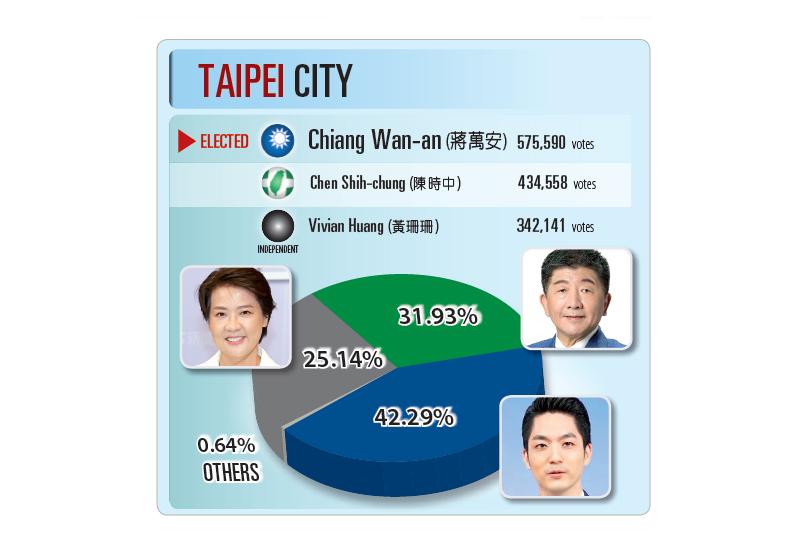

Chinese Nationalist Party (KMT) Chairman Eric Chu (朱立倫), spokeswoman Yang Chih-yu (楊智伃) and Legislator Hsieh Lung-chieh (謝龍介) would be summoned by police for questioning for leading an illegal assembly on Thursday evening last week, Minister of the Interior Liu Shyh-fang (劉世芳) said today. The three KMT officials led an assembly outside the Taipei City Prosecutors’ Office, a restricted area where public assembly is not allowed, protesting the questioning of several KMT staff and searches of KMT headquarters and offices in a recall petition forgery case. Chu, Yang and Hsieh are all suspected of contravening the Assembly and Parade Act (集會遊行法) by holding

PRAISE: Japanese visitor Takashi Kubota said the Taiwanese temple architecture images showcased in the AI Art Gallery were the most impressive displays he saw Taiwan does not have an official pavilion at the World Expo in Osaka, Japan, because of its diplomatic predicament, but the government-backed Tech World pavilion is drawing interest with its unique recreations of works by Taiwanese artists. The pavilion features an artificial intelligence (AI)-based art gallery showcasing works of famous Taiwanese artists from the Japanese colonial period using innovative technologies. Among its main simulated displays are Eastern gouache paintings by Chen Chin (陳進), Lin Yu-shan (林玉山) and Kuo Hsueh-hu (郭雪湖), who were the three young Taiwanese painters selected for the East Asian Painting exhibition in 1927. Gouache is a water-based

Taiwan would welcome the return of Honduras as a diplomatic ally if its next president decides to make such a move, Minister of Foreign Affairs Lin Chia-lung (林佳龍) said yesterday. “Of course, we would welcome Honduras if they want to restore diplomatic ties with Taiwan after their elections,” Lin said at a meeting of the legislature’s Foreign Affairs and National Defense Committee, when asked to comment on statements made by two of the three Honduran presidential candidates during the presidential campaign in the Central American country. Taiwan is paying close attention to the region as a whole in the wake of a

OFF-TARGET: More than 30,000 participants were expected to take part in the Games next month, but only 6,550 foreign and 19,400 Taiwanese athletes have registered Taipei city councilors yesterday blasted the organizers of next month’s World Masters Games over sudden timetable and venue changes, which they said have caused thousands of participants to back out of the international sporting event, among other organizational issues. They also cited visa delays and political interference by China as reasons many foreign athletes are requesting refunds for the event, to be held from May 17 to 30. Jointly organized by the Taipei and New Taipei City governments, the games have been rocked by numerous controversies since preparations began in 2020. Taipei City Councilor Lin Yen-feng (林延鳳) said yesterday that new measures by